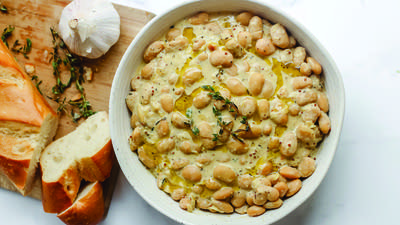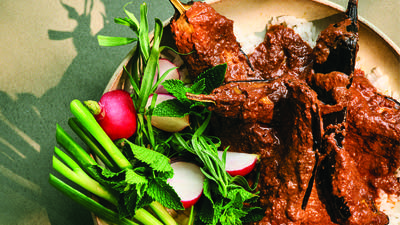
Throughout the Caribbean and American South, African slaves transformed the tails of oxen or other cattle, the discards of wealthy plantation owners, into a delicacy by slow-braising them in rich, fragrant stews. In Haiti, oxtail is served with pikliz, an intense peppery and sour slaw tart enough to make your jaws clench, similar in taste and texture to the Southern condiment chow chow. Pikliz is most often made with green cabbage, but I use red cabbage, which is prettier and slightly sweeter, and brussels sprouts, which have a hint of nuttiness. Serve with your favorite white rice.
Serves 2 to 4
INGREDIENTS
 Roots, Heart, Soul: The Story, Celebration, and Recipes of Afro Cuisine in America
Todd Richards
Roots, Heart, Soul: The Story, Celebration, and Recipes of Afro Cuisine in America
Todd Richards
2 pounds oxtails
2 tablespoons kosher salt
1 tablespoon freshly ground black pepper
1 teaspoon ground allspice
1 cup vegetable oil
4 celery stalks, chopped, including leaves
2 medium carrots, peeled and chopped
2 yellow onions, chopped
6 garlic cloves, minced
1 stalk lemongrass, tough outer leaves removed, chopped
4 bay leaves
1 cup dry red wine
2 tablespoons tomato paste
6 cups Beef Stock (page 26 or store-bought)
1 Scotch bonnet or habanero pepper
1 serrano pepper
Pikliz (See Below) for serving
DIRECTIONS
Preheat the oven to 350°F.
Rinse and pat dry the oxtails. Trim the fat with a sharp knife to a maximum of a 1/4 inch, then generously season the oxtails all over with the salt, black pepper, and allspice. Heat the oil in a dutch oven over medium heat. Working in batches, put the oxtails in the dutch oven and brown them on all sides, about 8 minutes total, then transfer to a paper towel–lined plate and set aside. Drain off the fat from the dutch oven.
Return the dutch oven to the stove and add the celery, carrots, onions, garlic, lemongrass, and bay leaves. Cook the vegetables over medium heat, stirring, until they start to brown, 4 to 6 minutes on each side. Add the red wine and tomato paste and bring to a boil. Return the oxtails to the pot and stir in the stock and the peppers. Bring to a simmer, then remove from the heat, cover, and transfer the pot to the oven.
Cook for 11/21/2 hours, or until the oxtails easily pull away from the bone. Fish out the bay leaves and peppers and serve with pikliz on the side.
Pikliz
Serves 4
8 brussels sprouts, shredded on a box grater or purchased pre-shredded
¼ head purple cabbage, thinly sliced
2 tablespoons kosher salt
1 carrot, peeled and shredded
1 red bell pepper, thinly sliced
1 serrano pepper, thinly sliced
2 garlic cloves, thinly sliced
1 shallot, thinly sliced
1 (1/21/2-inch) knob ginger, peeled and minced
4 cups water
2 cups apple cider vinegar
1 cup sugar
2 bay leaves
1 Scotch bonnet or habanero pepper
Put the brussels sprouts and cabbage in a large mixing bowl, cover with the salt, and let stand for 4 hours at room temperature. The sprouts and cabbage will release water but remain crisp. Drain off excess water. Stir in the carrot, bell pepper, serrano pepper, garlic, shallot, and ginger.
In a medium saucepan, bring the water, vinegar, sugar, and bay leaves to a simmer over medium heat, stirring to dissolve the sugar. Toss in the whole Scotch bonnet pepper and simmer for 2 minutes. Remove the pan from the heat and let stand for 10 minutes. Add the vegetables and let the pikliz sit, covered, for 5 minutes.
Ladle the vegetables into a glass container or, if storing for longer than 7 days, divide among sterilized canning jars. Top the slaw with the pickling liquid, removing the Scotch bonnet pepper. Refrigerate, covered, until cold before serving; store in the fridge for up to 2 weeks.
Reprinted from Roots, Heart, Soul: The Story, Celebration, and Recipes of Afro Cuisine in America by arrangement with Harvest, an imprint of HarperCollins Publishers. Copyright © 2024, Todd Richards, Amy Paige Condon.
When you shop using our links, we earn a small commission. It’s a great way to support public media at no extra cost to you!
Before you go...
Each week, The Splendid Table brings you stories that expand your world view, inspire you to try something new, and show how food connects us all. We rely on your generous support. For as little as $5 a month, you can have a lasting impact on The Splendid Table. And, when you donate, you’ll join a community of like-minded individuals who love good food, good conversation, and kitchen companionship. Show your love for The Splendid Table with a gift today.
Thank you for your support.
Donate today for as little as $5.00 a month. Your gift only takes a few minutes and has a lasting impact on The Splendid Table and you'll be welcomed into The Splendid Table Co-op.



